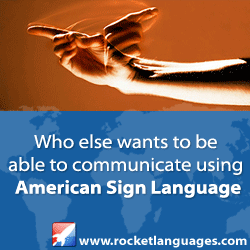American Sign Language Interpreter
0Interpreters for American Sign Language can be seen at more and more public and private events lending a hand (or two) to those who are audibly impaired.
American Sign Language, or ASL, is not just for people who are deaf. It is also great for the hard of hearing, or even for communicating when verbal communication isn’t ideal.
The role of interpreters is to help the people who are audibly impaired engage with the world of verbal communication through means of the non-verbal language, ASL.
What is a Sign Language Interpreter?
A sign language interpreter is a hearing person who is fluent in their specific sign language. This can take many years before someone is fluent enough to act as an interpreter. It is common for an interpreter to receive a certificate stating their qualification to interpret professionally.
ASL is one of the most popular sign language, but there are over 100 different non-verbal languages around the world.
As interpreters, these individuals work to bring together people who are audibly impaired and those who are hearing. They translate from a spoken language to a non-verbal language. In this case, American Sign Language.
Interpreters also have to be trustworthy. This may be a somewhat obvious statement, but it needs to be said. Integrity is very important for all sorts of translators. Miscommunication can lead to all kinds of issues if interpreters aren’t doing their jobs and interpreting accurately.
The national Registry of Interpreters for the Deaf helps to ensure that all ethical guidelines are adhered to by interpreters.
Utilizing a Sign Language Interpreter
In accordance with Americans with Disabilities Act (ADA), any audibly impaired individual is entitled to request the aid of an interpreter in a classroom. This extends to several other public stages, as well. Graduations are another common place to find interpreters.
To request an interpreter, contact a local agency of interpreters to check their availability and fees. You should be prepared with specifics about when, how long, and if the need for an interpreter is on a reoccurring basis.
Hiring an interpreter isn’t a last minute kind of decision. Or, at least, it isn’t ideal, nor is it considered socially correct. An interpreter should be schedule 5 days before their services are to be required, and that is the minimum.
Of course, it is more complex than just calling a number and getting an interpreter. Forms will need to be filled out and (in the case of an audibly impaired student) adjustments may be required in the classroom. Specifics should be discussed with the hired individual.
It is important to note that if your need for an interpreter will last more than an hour, you will require multiple interpreters. This is due to the effort that goes into portraying ideas across language barriers.
How to Become a Sign Language Interpreter
As stated above, becoming an official sign language interpreter takes a lot of work. There are countless hours and tons of training involved.
There are several skills you’ll need to be proficient in:
- Signing-to-voicing
- Voicing
- Voicing-to-signing
If you are interested in structured learning of these skill combined with the flexibility of an online environment, consider investing is Rocket Languages. If you aren’t sure, they do have a free trial so you can get a feel for their teaching methods.
Once you begin to grasp the language, immerse yourself in the culture by befriending those in the deaf community.
So maybe you’re already proficient in American Sign Language. What then? More training.
Fluency is only part of the journey. You then have to learn how to act as an interpreter. You need to learn the etiquette, how to work in various settings, as well as other specifics that will be required of you as an interpreter.
Then you apply to take the certification test. In a process that can take upwards up 150 days, you’ll have to
- take a written test
- take a performance test
- wait for the results
- then finally receive your certification, if you’re qualified
Perseverance is key throughout this whole journey.
Conclusion
Hiring an ASL interpreter can go a long way when it comes to catering to your entire audience, no matter how large or small.
Especially in a large or crowded room, reading the lips of the speaker or speaker can be difficult. Not to mention it isn’t guaranteed that a person who is audibly impaired even knows how to read lips.
The journey to becoming an American Sign Language interpreter is long and can sometimes feel tedious. A good language learning program—like Rocket Languages—can make things easier for you.

